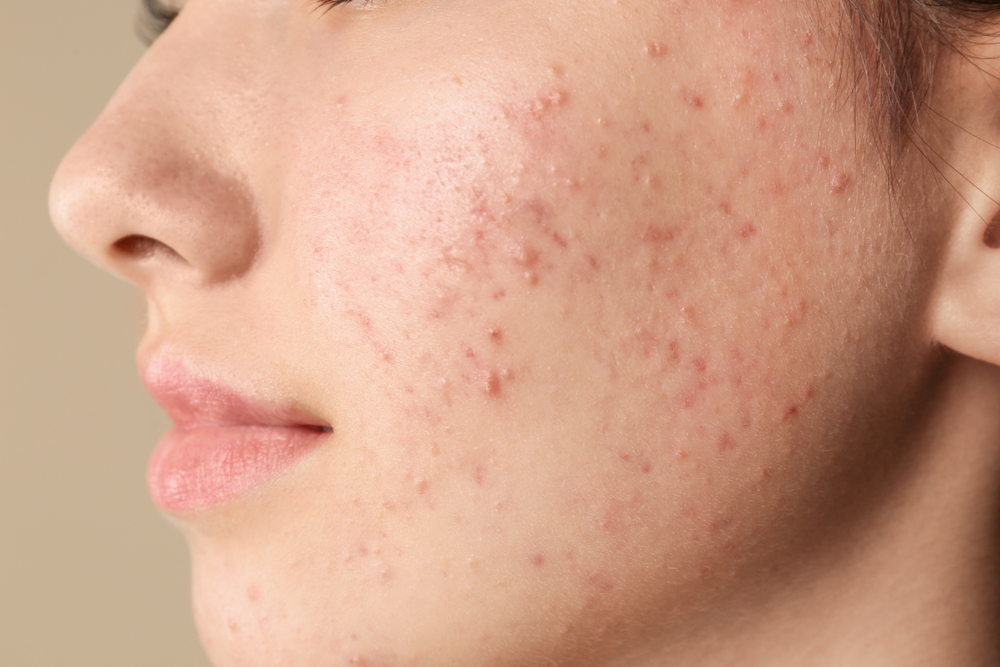Acne is a common skin condition that occurs when hair follicles become clogged with oil and dead skin cells, leading to the formation of pimples, blackheads, or whiteheads.
Acne can be tough to deal with, especially when it leaves behind scars, which are usually caused by damage to your skin’s collagen and elastin. Though most acne scars fade over time, for some people they can stay for longer.
If you have acne, don’t wait to see your doctor. Book an online consultation with a pharmacist to get the care and treatment you need.
How to get rid of acne scars
When it comes to getting rid of acne scars naturally and quickly, consistency is key.
Here’s a simple 6-step routine routine to follow:
Cleansing (5 minutes, twice daily):
Start by cleansing your face with a gentle, non-abrasive cleanser. Look for products containing salicylic acid or glycolic acid, which help exfoliate dead skin cells and promote skin renewal. Gently massage the cleanser onto damp skin for about a minute, then rinse thoroughly with lukewarm water. Pat your skin dry with a clean towel.
Exfoliation (2 minutes, every other day):
Exfoliation is crucial for removing dead skin cells and encouraging the growth of new, healthy skin. Opt for a natural exfoliant such as a sugar scrub or oatmeal mask. Apply the exfoliant to damp skin, gently massaging in circular motions for about a minute. Rinse thoroughly with lukewarm water and pat dry.
Healing Masks (15-20 minutes, 2-3 times a week):
Applying healing masks can help soothe inflammation and promote skin repair. Look for ingredients like honey, aloe vera, turmeric, or green tea, known for their anti-inflammatory and antioxidant properties. Apply a thin layer of the mask to clean, dry skin and leave it on for 15-20 minutes before rinsing off with lukewarm water.
Spot Treatment (2-3 minutes, as needed):
For targeted treatment of individual scars, consider using natural spot treatments such as tea tree oil or diluted apple cider vinegar. Apply a small amount directly onto the scar using a cotton swab or pad, then leave it on overnight for maximum effectiveness.
Moisturising (2 minutes, twice daily):
Keeping your skin well-hydrated is essential for promoting healing and preventing further damage. Choose a lightweight, non-comedogenic moisturiser suitable for your skin type. Apply a pea-sized amount to your face and neck, gently massaging in upward motions until fully absorbed.
Sun Protection (1 minute, every morning):
Protecting your skin from harmful UV rays is crucial, especially when treating acne scars. Apply a broad-spectrum sunscreen with an SPF of at least 30 every morning, even on cloudy days. Reapply every two hours if you’re exposed to direct sunlight.
Following this routine consistently for a week can help improve the appearance of acne scars naturally, but remember that individual results may vary. Additionally, if you have severe or persistent scarring, consider consulting with your pharmacist or dermatologist for personalised treatment.
Stay patient and committed to your skincare routine, and you’ll soon notice clearer, smoother skin.
Frequently asked questions about acne
How long do acne scars take to fade naturally?
Acne scars may fade naturally in weeks or months, varying by skin type and severity. Consistent skincare helps speed up the process.
What are the best natural remedies for acne scars?
Natural remedies like honey, aloe vera, tea tree oil, and vitamin C serums are effective for treating acne scars naturally.
Can acne scars be removed completely?
While complete removal of acne scars isn’t always possible, treatments like laser therapy and chemical peels can significantly improve their appearance.

